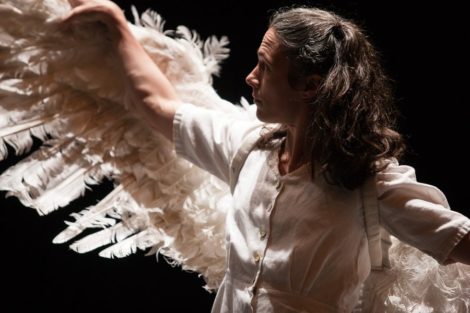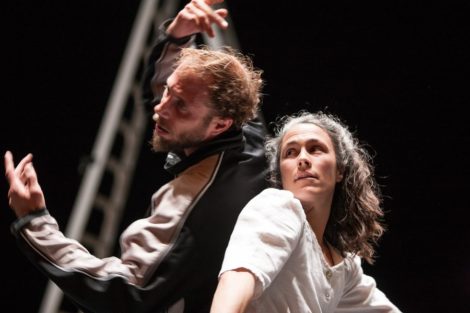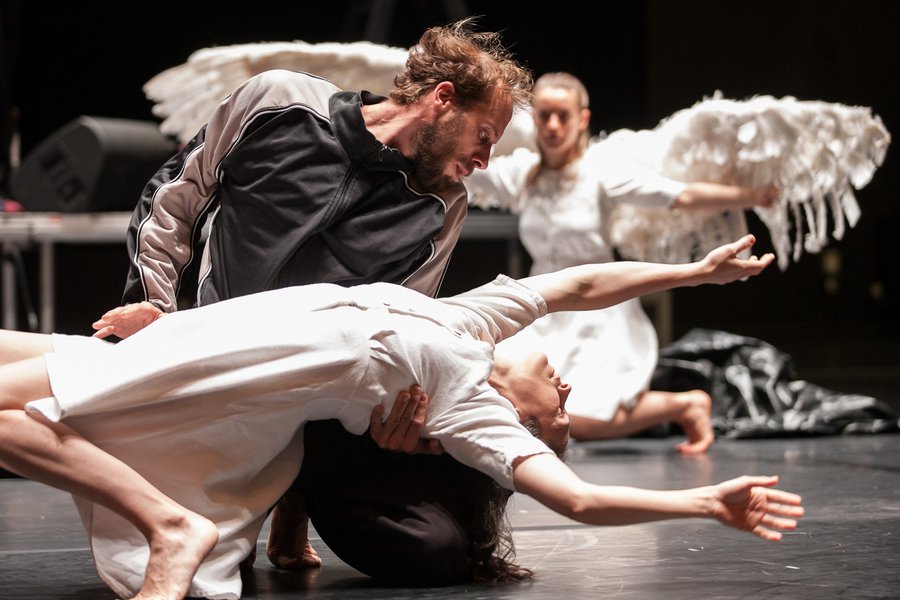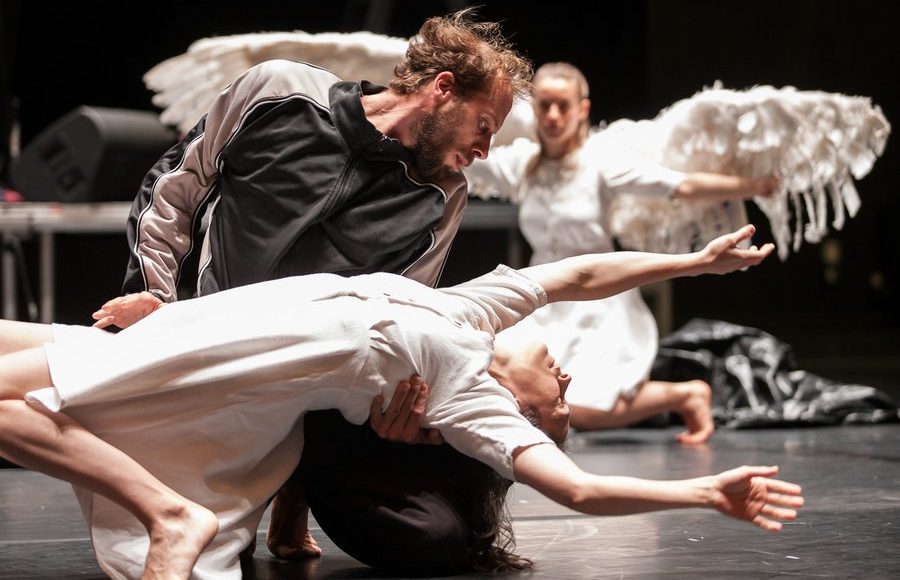St James Theatre Wellington, 14 March 2018
Choreography: Michael Keegan-Dolan. Music: Slow Moving Clouds
Reviewed by Jennifer Shennan
It is revealing to read an interview with Michael Keegan-Dolan in the local press in which he admits that he thinks this latest production, Swan Lake—Loch na hEala, is his best work to date. Many an artist would say the latest work is the best work—but it’s undeniably true that the thrust and ideas in this work are of unparalleled import and poignancy. It is hard to imagine another theatre work grappling so surely with old story and deep themes, revealing dark secrets and offering balm however briefly. This Lake of Swans is painfully beautiful, heartfelt, soulsprung, footstamped, wingborne, endearingly musiced, beyond reach and entirely present.
Keegan-Dolan’s earlier Giselle, Petrouchka and Rite of Spring, with his Fabulous Beast Dance Theatre, were all courageous and hugely memorable works, but Loch na hEala may well prove to be the most outstanding visionary work of its generation. It is an honour to write about the production, and important to thank the New Zealand Festival for their decision to bring this astonishing work to our town.
It’s a thrill to see Alex Leonhartsberger, consummate performer, in the central role (revives memories of Douglas Wright’s choreographies when Alex was in the cast). The exquisite Rachel Poirier is a wounded Dying Swan for our time (as Kilda Northcott was a few years back, muse to Douglas). Keegan-Dolan is to Ireland what Wright has always been to New Zealand, and that has to be my highest praise to them both. Kia ora korua. Salute to the pair of you.

W. B. Yeats’ poem, The Wild Swans at Coole, resonates with great birds ‘mysterious, beautiful’ that in turn evoke the exquisite 16th century madrigal by Orlando Gibbons ‘The silver swan that, living, had no note…’ (Swans in old tales are often bewitched women, rendered mute) ‘when Death approached unlocked her silent throat’. This trope is achingly, beautifully caught in the final pas de deux of love and comfort that is permitted to the two wounded and damaged characters of this production—Jimmy O’Reilly (read Prince Siegfried), and his adored Finola, (read Odette). It has the fragility of life, held by love, yet dead and gone too soon. You’ll be weeping now if ever you wept at anything. You’ll be back tomorrow night for a repeat viewing. That’s not masochism, it’s just too beautiful to see only once.
W. B. Yeats The Wild Swans of Coole
The trees are in their autumn beauty,
The woodland paths are dry,
Under the October twilight the water
Mirrors a still sky;
Upon the brimming water among the stones
Are nine-and-fifty swans.
The nineteenth autumn has come upon me
Since I first made my count;
I saw, before I had well finished,
All suddenly mount
And scatter wheeling in great broken rings
Upon their clamorous wings.
I have looked upon those brilliant creatures,
And now my heart is sore.
All’s changed since I, hearing at twilight,
The first time on this shore,
The bell-beat of their wings above my head,
Trod with a lighter tread.
Unwearied still, lover by lover,
They paddle in the cold
Companionable streams or climb the air;
Their hearts have not grown old;
Passion or conquest, wander where they will,
Attend upon them still.
But now they drift on the still water,
Mysterious, beautiful;
Among what rushes will they build,
By what lake’s edge or pool
Delight men’s eyes when I awake some day
To find they have flown away?
Orlando Gibbons’ madrigal, The Silver Swan, is one of the Poems in the London Underground now. The seventh Autumn has come upon me since my Allan slipped down and away, leaving us mute, so shocked at his leaving. Unreal. Not real. Did he not love us enough to fight and slay the dreaded Count Leukaemia von Rothbart and stay with us in the happy nest of our home? What was he thinking to go away and leave the garden unweeded, the lawn all unmown, the orchard overgrowing, the path too thin as its spread of metal wears away, all his books on these shelves with bookmarks still upstanding, his dressing gown hanging on the back of the door, his gumboots by the garden shed, the plum tree that presages Spring, the Christmas pohutukawa of summer, the gold & red leafed grapevine ushering in Autumn, the darling tiny snowdrops so sweet, so perfect, so silent in cold Winter. Why did I waste you? Why did I lose you? Why did I not hold you tighter, stop you getting away? We could have made it. We could have fixed everything. We still could. Don’t unlock your silent throat, don’t sing or Count von Rothbart will get you. The clematis, the one you planted for Beth, needs pruning. Then there’s the little daffodil, the scented one you planted so tenderly under our window when Nell was born. I need you here to help me find that bulb gone underground. Don’t go. Please stay. Don’t leave. No wonder tears drenched my dress as Jimmy danced with Finola. You would have drenched yours too.

In the afore-mentioned interview Keegan-Dolan admits he is interested when people come back for repeat viewings of his show, and he wonders why they do. I’ll tell him why. I just did.
Jennifer Shennan, 20 March 2018
Follow this link to Jennifer Shennan’s review for Radio New Zealand’s Upbeat program.
Featured image: Alex Leonhartsberger as Jimmy O’Reilly and Rachel Poirier as Finola in Michael Keegan-Dolan’s Loch na hEala (Swan Lake), Wellington, 2018

‘Don’t be afraid of the dark—it is your friend’
All photos: 2018 New Zealand Festival. The Wellington Airport Season of Swan Lake/Loch Na hEala. © Photos: Matt Grace

One thought on “Swan Lake—Loch na hEala. Michael Keegan-Dolan”